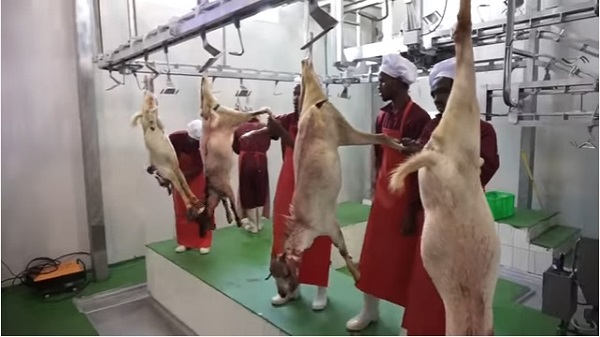
A $1.5 million loan from Feed the Future helped Jigjiga Export Slaughter House purchase refrigerators and trucks for the facility, which employs 100 people from local villages.
By Lesley Wroughton (Reuters)
JIGJIGA, Ethiopia–An abattoir located among herding communities in Ethiopia’s eastern Somali region, known more for droughts and famine than business opportunities, is an unusual stop for a U.S. aid administrator.
But USAID chief Mark Green stopped at the Jigjiga Export Slaughter House (JESH) during a visit to Jigjiga on Wednesday to see the effects of a crippling drought that has pushed some areas to the south to the brink of famine.
The abattoir buys goats, sheep, cows and camels for slaughter from herders to export to the Middle East, giving families cash to buy food during the drought.
A $1.5 million loan from Feed the Future helped purchase refrigerators and trucks for the facility, which employs 100 people from local villages.
Feed the Future is a $1 billion-a-year agricultural program launched during U.S. President Barack Obama’s presidency in 2010.
To Green, the slaughterhouse represents what USAID can do to mobilize private-sector money for investments that increase farming productivity in developing countries.
Climate changes are threatening the way of life of Nomadic herders, forcing them to move away from traditional grazing grounds and find alternative livelihoods.
While at the abattoir, Green announced 12 countries that would benefit from Feed The Future investments, signalling that the program would survive despite proposed deep cuts to USAID’s budget by the Trump administration.
The 12 countries, down from 19 in anticipation of budget cuts next fiscal year, are Bangladesh, Ethiopia, Ghana, Guatemala, Honduras, Kenya, Mali, Nepal, Niger, Nigeria, Senegal and Uganda.
Green said investments like the Jigjiga slaughterhouse not only created markets for American businesses but helped communities out of poverty. Herders can earn as much as $80 per goat when they sell to the slaughterhouse.
“I’m under no illusions; the development journey in many places in the world is a long one, but I want us to always be thinking what we can do that nudges something towards a day when people get to take care of themselves,” he said.
“This is a place where we see some of the benefits and the potential for Feed the Future,” Green added.
Read the complete story at Reuters
——
See also:
- Norfund Invests in a Beef Exporter in Ethiopia
- Finnfund to Invest in Ethiopian Poultry Company: EthioChicken
- EMDIDI: Ethiopia Set to Raise Meat, Meat Product Export Revenue
- Ethiopia Eyeing U.S.$12 Million from Ramadan Meat Export – EMDIDI
- VIDEO: Jijiga Export Slaughter House Connects Pastoralists to International Markets
